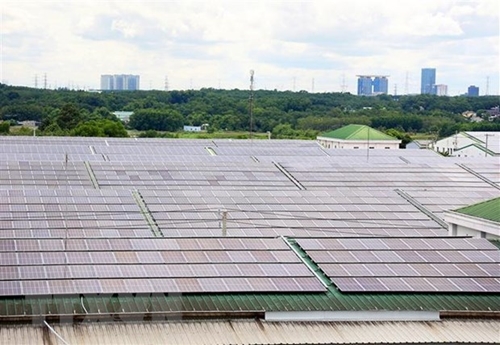CIEM Director Tran Thi Hong Minh said the Prime Minister’s Decision 687/QD-TTg, issued in 2022, approving the plan on circular economy development in Vietnam is one of the country’s first important efforts to identify the road map, requirements, and orientations in this regard.
    |
 |
|
Solar panels have been installed at many industrial parks, becoming an environmentally friendly source of power generation. |
To soon develop a circular economy and benefit from it, it is particularly important to create momentum for businesses and investors to conduct digital transformation and invent circular economy models, especially in such potential sectors as agriculture, industry, energy, and construction material production, she noted.
Nguyen Anh Duong, Head of the CIEM division for general studies, said a circular economy will provide an impetus for innovation and labor productivity improvement, which will help achieve economic prosperity, environmental sustainability, and social equality.
However, Vietnam is encountering considerable challenges, including natural resource depletion, environmental pollution, and climate change, which are becoming more complex amid the growing population, fast urbanization and industrialization, and slow transition.
Facing those challenges, the country needs to have a more serious view of sustainable development requirements, enhance its economy’s independence and self-reliance, and promote the resilience of supply chains. In particular, developing circular economy models is one of the important solutions and directions that many countries are adopting, Duong went on.
Minh said to give “vitality” to the policies on circular economy development, the traditional approach is necessary but insufficient, adding it is necessary to gain more momentum green recovery fostering efforts.
An important task in this regard is to build a decree on a regulatory sandbox for circular economy development. This decree is being drafted by the Ministry of Planning and Investment and will be submitted to the Government in the second quarter of 2023.
The early formation of a solid legal basis for circular economy development will also help implement relevant international cooperation commitments, she added.
With the facts pointed out and suggestions raised at the seminar, CIEM hoped to propose an effective regulatory sandbox and help complete the draft decree in the time ahead.
Source: VNA